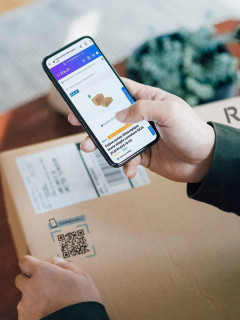With the explosion of e-commerce and the ever-increasing demands of end customers in terms of speed, the logistics sector has undergone a real upheaval in recent years.As a logistics provider, you are already putting in place a number of processes to make your day-to-day logistics management more fluid and to ensure that your services are optimally performed. But do you think you need a logistics platform?This is the question that we are going to allow you to answer, by revealing to you the 5 most frequently asked questions on the subject.
1. What is a logistics platform?
A logistics platform is a place where products from different suppliers converge. Traditionally, in a logistics platform, the merchandise is already packaged, and the parcels are only in transit: they go directly from the
truck
unloading platform
- Logistics flows are faster and smoother, which ensures high customer satisfaction with extremely fast goods transport and dispatch.
- Order picking and packaging of goods are not taken care of in the warehouse, allowing you, as a logistician, to concentrate on the business activities of your company.
- The costs of storing goods and warehouse management are reduced, as they are no longer borne by you, but by the logistics centre itself.
- It is also possible to benefit from pooled transport costs with certain logistics platforms, which makes it possible to dispatch goods at lower cost.
4.
Do you need a logistics hub?
Although the advantages of such a solution seem interesting, not every type of logistics activity needs a logistics hub. Some companies prefer to keep all their logistics and transport activities in one place, from procurement and warehousing to the delivery of goods. You might need a logistics hub if you need to
- Handling urgent parcels, such as perishable products, daily newspapers, or e-commerce express deliveries that require a real reactivity in the shipments.
- Manage a seasonal activity, with shipping peaks that require flexible organisation, or occasional external help to ensure fast and well-prepared orders.
- Simply concentrate on your core business, without having to take charge of stock management, flow management or handling.
you can either set up your own logistics platform or use a company that specialises in this type of logistics service (third party logistics or 3PL).
5. What are the keys to managing or choosing your logistics platform?
Whether you want to outsource part of your logistics services to an external service provider or set up your own logistics platform, it is crucial to ensure that you follow a few good practices. In addition to organising the logistics on this platform in a rational manner, you (or your logistics provider) must keep in mind the experience that your customers will have with your brand. Here are some keys to keep in mind when organising this key platform
- Makesure you have a WMS (Warehouse Management System) and/or TMS (Transport Management System) in place. The aim is to ensure optimum traceability of your goods, optimise the availability of loading and unloading bays and manage carriers. These digital logistics solutions allow you to keep a close eye on these various elements at all times
- Set upan optimal labelling system for goods, to ensure that you have a clear view of their traceability on the platform, and avoid stock or order errors.
- Pay attention to the quality of the order preparation process. In addition to picking, which must be optimal to avoid order errors, the packaging of your products must also be optimal. The aim is to ensure a good customer experience when your customers receive their parcels. Be careful to set up packaging processes with your logistics service providers (particularly if you use a logistics outsourcing service).
- Payattention to the quality of deliveries too– this is the point of contact between your company’s logistics and your end customer, and therefore defines the experience you offer your customers.
with these various best practices in mind, you are ready to ensure well streamlined and customer experience oriented logistics operations on your logistics hub















